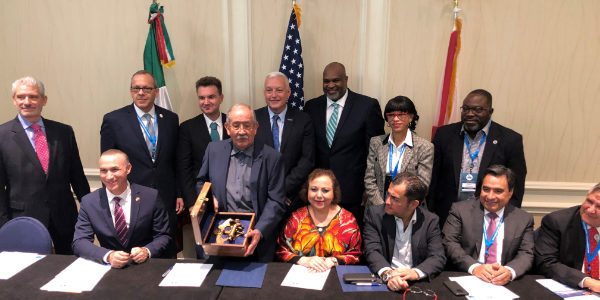Florida and Mexico sign deal for maritime trade improvement

A consortium of Florida seaports has signed an agreement with Mexico to enhance international trade, marking a rare move of cooperation in a year that has featured ongoing trade wars like the U.S. tariffs on imports from China and the U.S. Mexico Canada Agreement (USMCA) that is proposed to replace the North American Free Trade Agreement (NAFTA).
Acting on behalf of the state's 15 seaports, the Tallahassee-based Florida Ports Council (FPC) has entered into a Letter of Intent (LOI) with the Coordination of Ports and Merchant Marine (Coordinadora de Puertos) of Mexico to maintain relations that promote international commerce and economic development, the two groups said Wednesday.
The Coordination of Ports and Merchant Marine is an agency of the Ministry of Communications and Transportation of Mexico that strengthens the international development of maritime ports, export promotion, international commerce, and the internal market.
The letter could lead to time and cost savings for both regions by maximizing the efficiencies of all-water trade between the Florida ports and Mexican gulf ports. The parties further expect more opportunities to promote port development, improve communications and logistics, take advantage of new technologies, and strengthen institutional relations that will enhance international commerce and economic development.
That agreement would be substantial because Mexico is Florida's second largest trading partner, ringing up $10.8 billion of trade in 2018, an 8.3% increase over 2017 in exports alone. "While Mexico has been one of Florida's strongest trading partners for years, there are real opportunities currently for growth in bilateral waterborne trade, and our partners in Mexico are enthusiastic about exploring the benefits and solutions all-water routes can provide," Doug Wheeler, president and CEO of the Florida Ports Council, said in a release.
A key joint initiative of the LOI includes the creation of a working group of maritime commerce leaders from Mexico and Florida to review and identify issues, opportunities, and challenges of enhancing the flow of international commerce, including: data analysis, identification of technological and regulatory enhancements, and development of infrastructure facilitating sea transport.
Florida and Mexican seaports signed an agreement yesterday at @AAPALatino to enhance growth in bilateral waterborne trade - a result of the incredible collaboration from @ConsulMexMia, @JchaitA, @EnterpriseFL and all the #FlaPorts and Mexican gulf ports. https://t.co/MTRskjhbla pic.twitter.com/1YajwOFZXr
— FloridaPortsCouncil (@FloridaPorts) November 21, 2019
Related Articles
Copyright ©2024. All Rights ReservedDesign, CMS, Hosting & Web Development :: ePublishing